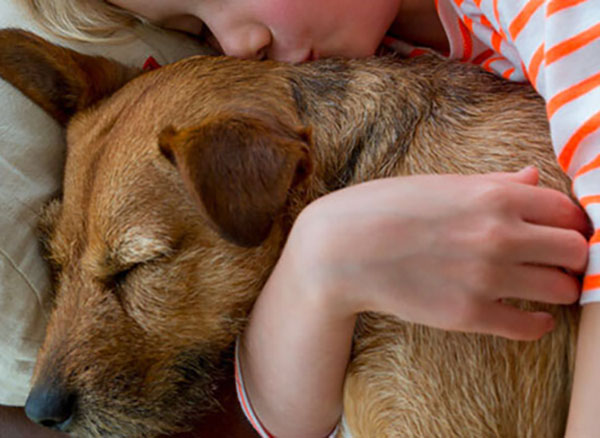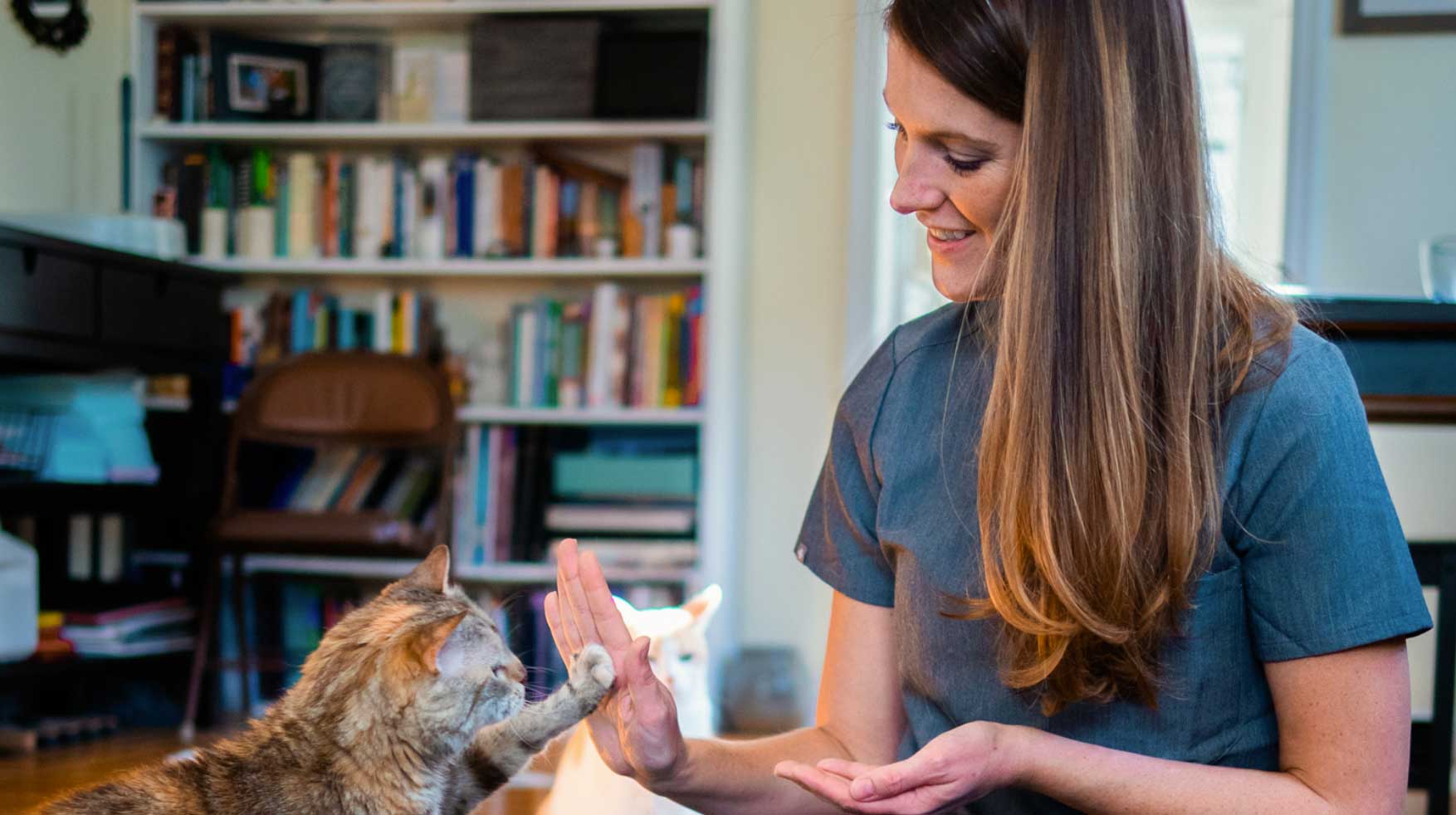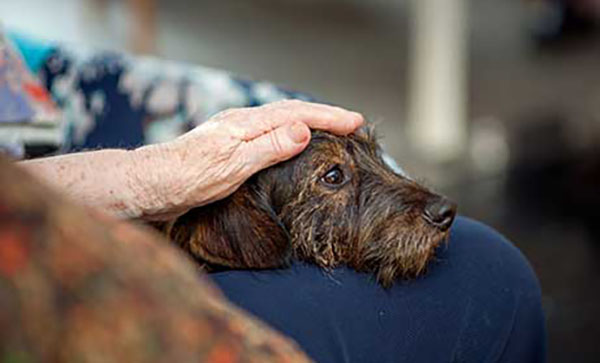We know that every pet's journey is unique.
In-home euthanasia services.
- Unhurried appointment with a personal experience and the opportunity to discuss questions or concerns
- Paw print memorial and fur clipping included
- Premium Individual cremation: the package includes cremation, choice of urn with custom name plate for wooden urns, a complementary claw paw print and shipping.
- Basic Individual cremation: the package includes cremation, a hand carved rosewood urn, complementary clay paw print and shipping.
- Communal cremation: the package includes cremation, a complementary clay paw print and shipping. Your pet's ashes are respectfully scattered in a memorial garden.
View our aftercare options and packages for more information on packages, available urns and clay paw prints.
What can I expect?
The right kind of care for the best rest of life.
In-home comfort care services.
Pet comfort care aims to meet the physical and mental needs of a pet faced with quality of life issues related to aging, pain or life-limiting illness.
A medical consultation by our trained veterinarian includes:
- Comprehensive review of your pet’s medical records
- One month of medical management, communication and plan adjustments with your dedicated BluePearl Pet Hospice care team
- Family education and review of home care routines, including diet
- Review of your pet’s environment to increase comfort
- Support from your pet’s dedicated care team available seven days a week
- Discussion of disease concerns and what to anticipate as disease progresses
- Discussion about your pet’s health, quality of life, nursing care, potential environmental improvements, and the plan and timing for euthanasia
- Written summary of your consultation emailed to you and your veterinarian
- This visit does not include the dispensing of medications or ongoing management of your pet’s care. If this is needed, a Comfort Care Consultation is recommended.
- Initial consultation includes a complete review of medical records, physical exam and the first acupuncture treatment
Laser therapy offers a fast-acting, non-invasive, therapeutic treatment for a wide variety of conditions. Decreased inflammation, decreased pain and accelerated healing is achieved when a sufficient dose of light energy reaches the target tissue.
Therapy can be implemented for:
- Dental procedures
- Infections
- Sprains
- Post-surgical care
- Osteoarthritis
- Fractures
- Inflammatory bowel disease
- Wounds
- Degenerative joint disease
- A variety of skin conditions
An In-Home Comfort Care Consultation with one of our veterinarians is required to begin laser therapy.
What can I expect?
Meet our veterinarians.
Elke Rudloff
DVM, DACVECC, CVMA, CPEVDr. Elke Rudloff provides holistic comfort care, individualized pain management and gentle euthanasia services in the home. She finds it highly rewarding to bring a family together that may be at odds about the quality of life of their beloved pet. She is grateful for the impact she has on her patients and their families when she can mitigate the pain and discomfort that come with acute and chronic illness and injury. The best way she knows how to use her specialized skills is by creating a peaceful and gentle passing for a beloved pet in the comfort of their home.
- Certified RECOVER Instructor BLS/ALS
- Certified Peaceful Euthanasia Veterinarian
- Certified Veterinary Medical Acupuncturist
- Diplomate, American College of Veterinary Emergency & Critical Care
- Residency, Emergency & Critical Care, Animal Referral Center, Glendale, WI
- Internship, Emergency & Critical Care, Animal Referral Center, Glendale, WI
- Doctor of Veterinary Medicine, Purdue University, West Lafayette, IN
- Bachelor of Science, Biology, Purdue University, West Lafayette, IN
Dr. Elke finds joy in experiencing all that nature and the earth have to offer. She is a novice fly-fisher and Master Gardener volunteer. She and her family enjoy hiking, camping, canoeing, sailing, and any other adventures that bring them together outdoors.
Testimonials from our clients.
"I would highly recommend using Pet Hospice. I had an amazing team to work with and they helped make a tough time, just a little bit less tough."
"They provided so much comfort during an unexpectedly traumatic time. Everyone was so respectful, compassionate, sensitive, and thoughtful to our needs ... even the ones we didn't realize we had."
"Since all the care is based out of home, Bruce was much more comfortable and relaxed. We were able to put stress to side and get him the best care possible."
Frequently asked questions.
You can feed your pet or offer favorite treats if he or she is eating.
On rare occasions, nausea can happen following sedation, but this is generally due to either your pet’s underlying disease process or sensitivity to medication, not the fact that you let your pet enjoy a favorite treat or meal.
The only medications we recommend you give your pet on the day of euthanasia are “comfort medications” such as pain or anti-nausea medications, if you are giving them, and they will not interfere with the euthanasia process.
Children should ideally have the opportunity to say goodbye to their companion. In our experience, children over five years old are amazingly present and engaged, and will often impress with their understanding and acceptance.
Of course, this decision is ultimately the choice of the parent. Some parents elect to have children at home but in a different room for the actual passing. This helps ensure they are insulated from the parent’s emotions (which is usually harder for them to deal with than the actual loss of the pet), but still allow them to say their goodbyes after the passing, before the pet leaves the home.
For children younger than five, they seem to be unsure about what’s going on and are, again, more upset by the parent’s emotions than by the loss of the pet. Still, we believe open communication about the loss is usually the best policy even for this age.
Upon request, our care coordinators can email you a helpful resource from The Ohio State University that shares how to best help children cope with serious illness or death of a pet.
- We will care for every possible need so that your only focus is being with your pet.
- We provide soft blankets, “potty pads,” and arrange for a paw print to be made by the crematorium.
- We care for all of your pet’s cremation and transportation arrangements, and provide a stretcher that allows for the gentle movement of pets from their home to our vehicle.
- We notify your veterinarian(s) so that you do not need to make that difficult call.
We understand that new people can be intimidating and that some pets experience “stranger danger.”
In the situation where a pet may be extra nervous, or potentially prone to biting, please let our care coordinators know. We will work with you to develop a specialized approach, helping to remove any anxiety or fear and in turn making these moments as stress-free as possible for both you and your pet.
In our experience, we find other household pets absolutely need this time to say goodbye, just like any family member.
Most pets seem to understand what is going on, and will sit quietly and attentively, honoring the process much in the same way as you do. If you feel your pet may be disruptive to the process, they can be placed in another room and allowed to say goodbye once their friend has passed.
Being able to see and smell their friend allows for closure, which is important in the grieving process. Following the loss of their friend, they may act depressed for a day or so after, but generally return to their normal behaviors and routines following this time. We offer as much time as needed for all members of the family to say their goodbyes.
- Nursing care education
- Assessment of the home environment
- In-home diagnostics such as blood work, urinalysis and blood pressure monitoring
- Preparation and planning for emergencies
- Nutrition counseling
- Facilitating end-of-life decisions
- Consultation: When should we consider euthanasia? What is the best way to plan for this time?
- Pet loss support focused on anticipatory grief
- Cohesive and collaborative care with your veterinarian and veterinary specialists
No, a Comfort Care relationship is appropriate at any stage of disease, and the sooner the relationship is started, the better.
The sooner Comfort Care is started, the more you and your pet can benefit. It is proactive care that can start at any stage of disease to greatly improve comfort and quality of life for months or years.
- A progressive disease such as arthritis, kidney disease or heart failure
- An incurable illness, such as cancer
- A disease for which you do not wish to pursue additional diagnostics, surgery or other therapies in lieu of comfort-oriented care
- A disease for which you do wish to pursue additional treatments (such as chemotherapy) but would benefit from additional support
- A long-term disability such as poor mobility, neurological disorders or disc disease
- “Old age” issues such as a general slowing down, nighttime anxiety or cognitive dysfunction (“doggy dementia”)
A “Comfort Kit” is something we dispense to our comfort care families when we are concerned that an emergency might happen, such as sudden distress or pain.
A Comfort Kit includes several pre-loaded syringes of a pain medication plus a sedative that families can give by subcutaneous (under the skin) injection in the case of an emergency. This easily administered injection provides both pain relief and sedation, and reduces any feelings of discomfort or distress.
A Comfort Kit provides relief not just for the pet, but for the family as well. For example, if a sudden crisis were to occur in the middle of the night, families would have on hand an intervention that will provide comfort until the vet arrives for euthanasia or reevaluation, or to provide comfort while en route to an emergency hospital if care is needed in the middle of the night.



